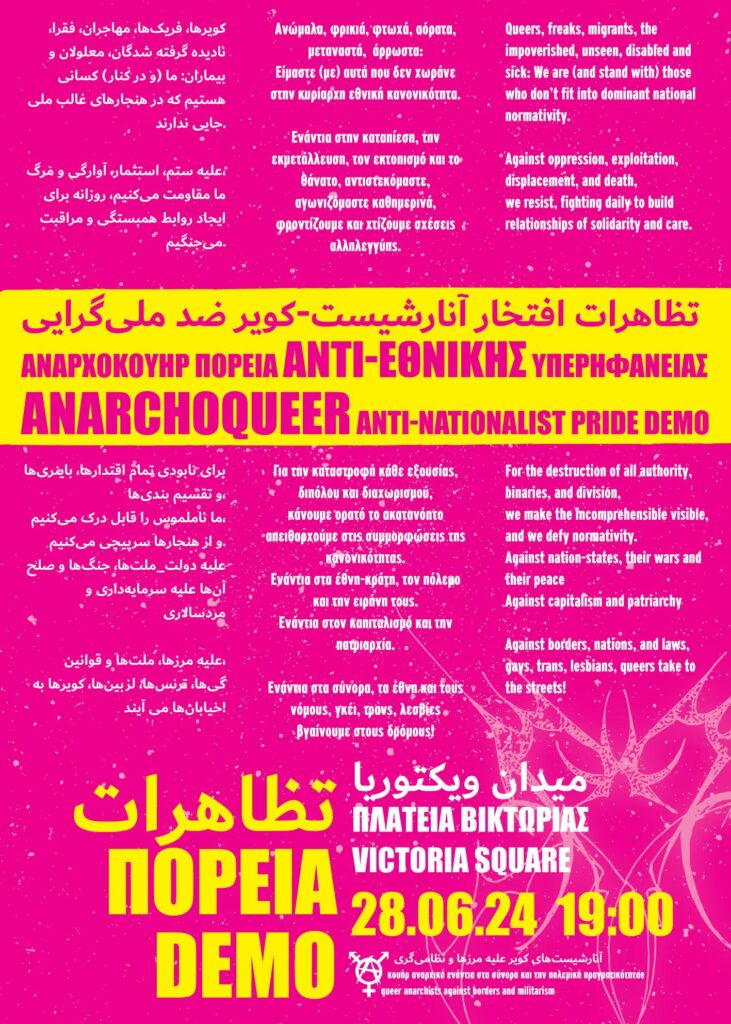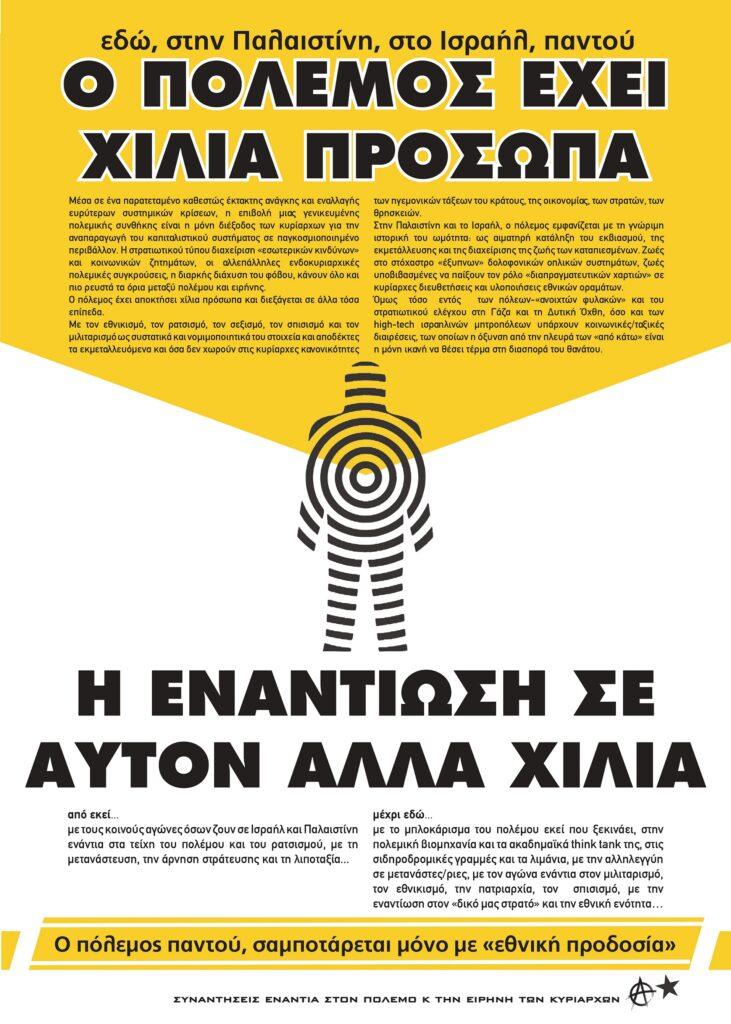It’s the year 2024, and we are experiencing the first athens pride after the legalization of gay marriage in greece.
So, what did we actually gain from the legalization of same-sex marriage? Can we at long last frolic through flower-filled fields with partners in hand, show up with Takis at the family dinner table, make out wistfully at school lunch break with the ex who dumped us, walk proudly from Alexandroupoli to Gazi? Perhaps this seems exaggerated, perhaps not entirely. Not everyone goes to Gazi on foot, in any case. And not everyone even goes to Gazi.
The real issue for us is not whether we won and what we won, but rather that we are called upon to even answer this question.We refuse to dwell on the ‘yes/no’ pontificating that has dominated public discourse since the passing of the new law.
We do not want to patronize queers of previous generations, who faced literal persecution by the state for their sexual expression, nor dispute that today’s visibility and institutional recognition represent a real, material rupture with the past. We know everyday life can be a scary place and understand that seeking warmth, tenderness, a sense of belonging, and being ourselves while feeling safe from harassment is an entirely legitimate need. Rather we suggest moving beyond false binaries of ‘yes/ no’ to marriage, and ask instead: what was sacrificed along the way for homosexuality to be legally recognized, accepted and even cool?
Could coming out of the closet signpost the devaluation of all our justified anger and suppressed desires? It feels like only yesterday when gay communities were burying their dead from the HIV epidemic, whereas now, symbols of queerness are commercialized and found for sale at Tiger. The essence of capitalist assimilation lies in the lighting-fast transformation of what was once on the margins into a commodity. And naturally, the margin is never left empty – it is expected to be populated with ever-new, unnatural, asymmetrical and monstrous bodies.
In an attempt to steer clear of the dominant pseudo-dilemma, our aim here is to express what we truly want from this whole narrative:
1. Let’s not forget the basics:
The need for a framework that recognizes same-sex couples and their families arises definitionally from their exclusion, just as every right and every claim to equality reflects the primal violence of the law: the separation between the legal and the illegal by state power, and which lives are deemed worth living while others are actively left to deteriorate or even perish.
Marriage, as defined by the state, determines what ‘kinship’ means within a strict framework that necessitates ‘blood’ (biological descent and ancestry) and a (reproductive) couple. If a multitude of intimate relationships and practices exist that attend to the reproduction of life and care, from cohabitation and polyamorous relationships to crews, associations and friendships as well as relationships with other species, the state limits these by ordaining marriage as the privileged site where social reproduction and care are both legally framed and also disciplinarily demanded for the reproduction of existing social relations.
The family, as a structural component of patriarchy, reinforces the separation between the public and private spheres. Sexist violence, abuse and the shouts from next door are treated as private matters concerning the couple and the family, rather than acknowledged as broader societal issues. Marriage and the family, identified as domains of legal privilege, shape and entrench social relations, teaching us how to perform and conform to gender roles, how to fall in love and how to fuck, how to navigate romantic relationships and relate in ways that make up a productive, disciplined, and nationally cohesive population.
Queerness for us is a practice of disrupting this very coherence. It is the affirmation of an openness to explore the countless forms that kinship, love, romance, friendship and coexistence can take.
2. Wars in the west are washed with pink
We perceive every step towards institutional recognition as a process that reinforces the logic of the ‘border’ in everyday life. Beyond its material basis, the border can thus be seen as a dynamic, mobile system of discipline and surveillance of all that falls outside the boundaries of national normativity, whether posing a threat or threatened by it. From national borders that bring death to anything that doesn’t align with national pride and economic exploitation, to the line drawn between ‘us and them’ by nationalist ideologies. From the borders that dominant heteronormativity imposes on our bodies as they struggle to express themselves and breathe freely, to the borders drawn on the cities’ bodies with every new enclosure and encroaching gentrification. For all that the poor, incarcerated, trans, and immigrants are faced with- those who do not conform, or fail to, or choose not to fit the national narrative of inclusivity, progress and peace.
The marriage equality act comes into effect during a time of war and conflict geographically and geopolitically close to “home”. The russian-ukrainian war rages on, causing countless deaths and injuries as the two armies continue to exchange bloodstained earth and industrial cement. Meanwhile, the israeli state persists in killing, displacing, and impoverishing palestinian populations and communities. We are inclined to view this juxtaposition through a familiar racist lens: On one hand, the ‘west’ as a conflict-free entity, guided by humanism and only the best intentions, even when waging war. On the other hand, inadmissible to the cultural teachings of the former, the ‘east’— underdeveloped, uncivilized, and foreign. So, while the greek state, like all western states, decides to legalize same-sex marriage, it also administers “civilizing” lessons by sending frigates to the coast of yemen. On the one hand, it sponsors and assists the organization of pride marches in its cities, advertising its tolerance and inclusion; on the other hand, it scrutnizes the LGBTQI+ identity of queer immigrants seeking asylum with fast-track interviews; it overlooks the hunting down of immigrants by nationalist groups, targets migrants for fires that burn thousands of acres of forest, murders hundreds of migrants on the evros and aegean/ionian borders and conceals the racist and patriarchal construction of its legal order.
All of these actions are not contradictory, but rather complementary. We are not swayed by laws that claim to promote equality, or by corporate sponsorships of pride events that seek to cleanse their corporate image by promoting peace, solidarity, and equal treatment in the workplace. We are outraged by the sight of israeli soldiers raising rainbow flags on the killing fields, thereby legitimizing the genocide of palestinians ‘in the name of love’.
We wink cunningly to all who are suspicious with the courteous façade of the democratic world. We stand in solidarity with the hundreds of thousands of disobedients of the ukrainian and russian armies who refuse to be disposable pawns in their masters’ war games; with those who refuse conscription, and every person resisting within israel and palestine. We stand in solidarity with immigrants subjected to the violence of borders, states, nationalisms and patriarchy. This solidarity makes us repeat: no one is truly free unless we are not all free.
3. Living to work, we die working, or just get ready for work, work, work, work, work, work
The demands made by movements of previous decades have led to the decriminalization of homosexuality in western countries. Since, however, in these same states the only conceivable organization of life is that of capitalism and the free market, queerness has been turned into a commodity. As a result, new subjectivities modeled on the heteornormative standard have emerged, bringing a greater variety of sexuality and gender characteristics to the fore, which neverthless still conform to an individual-focused logic of consumption that renders class struggle invisible.
According to the law on equal treatment at work, which is modeled on similar integration measures in other eu states, discrimination based on sexual orientation, identity or gender characteristics, among other factors, is prohibited. It’s widely known among us who work in this environment that it in fact it is very challenging for an employee to prove that they are discriminated against, especially considering the daily struggle with precariousness, long working hours, employer intimidation, and for those who are not from european countries and are reliant on special permits, the fear of deportation. The most recent legislative regulations – law 5053-2023 – only serves to strengthen these conditions. Getting fired is seen as a personal failure, while complete alignment with the bosses’ interests is considered the key to success in climbing the corporate ladder.
4. Athens Pride Inc: Advertisments, Washes, Tour guides, Investments
The only way to relieve this daily pressure is to seek solace in the embrace of yet another corporation, this time as consumer. In recent years, especially every June, large multinational corporations encourage us to spend the money we have left over from paying our ever-increasing rent and electricity bills, as their products are now marketed to us as well -as evidenced by the prominent display of rainbow flags in their vitrines. At the same time, these companies annually participate in athens pride to showcase their inclusivity, whilst attempting to ‘wash away’ any legal or illegal labor abuses, along with, in many cases, their connection to the military industry. In other words, pinkwashing and rainbow capitalism.
In a prime example, Google, one of the top sponsors of this year’s pride and a corporation overhwhelmingly responsible for the transformation of the internet into a means of collecting marketable data, has signed, together with Amazon, an agreement in the order of 1.2 billion dollars with the israeli ministry of defense and army. The onassis foundation, another gold sponsor, has been actively capitalizing on queer counterculture and selling ‘alternativeness’ in ‘major cultural centres’ and encroaching on the ever-shrinking public sphere. Among the remaining sponsors of this year’s athens pride are Teleperformance, Lidl and E-Food, who in recent years have excelled in dismissals, unpaid wages, daily belittling, disciplining and discrimination of workers based on age, gender, race and sexuality. Inclusive bosses suck us dry,inclusively.
Athens pride is also, and inevitably, imbricated in the tourism industry- otherwise known as the ‘national product’- which invites mainly wealthy westerners to consume LGBTQ+ ‘friendliness’ in hotels, bars, cafes, saunas and restaurants that are open all year-round to tourism in Athens and the gay-island capitals (Mykonos, Eressos).
5. One girl kisses the other and both kick fascists
The current discourse surrounding LGBTQI+ rights and marriage has catalyzed a political redefinition and a resurgence of – already non-stop and daily- homotransphobic attacks. From the greek householder threatened by any departure from ‘natural’ male dominance, to fascist groups organizing in the street, aggressively targeting immigrants and queers whilst plastering city walls with swastikas, a conspiratorial reading of reality is being peddled where gays and an imported ‘new world order’ replace the state and capitalism as the true ‘enemies of the people’. According to this narrative, gays rule the world, threatening the greek nation with annihilation through the weakening of traditional family and gender roles (we wish). The notion of a powerful elite manipulating events is hardly unique to this context, as it has previously appeared in a well-known anti-semitic iteration.
6. So, after all, what does ‘queer pride’ mean?
As queers, we live in an era of particular contradiction: On one hand, we face a conservative backlash that portrays us as the great threat to the social order and its institutions. On the other hand, assimilationist policies lead us to a despair borne from feeling unable to bring about the destruction of the social order and its institutions.
When the European Union, which murders immigrants to protect its borders, sponsors Athens Pride and this year’s EuroPride in Thessaloniki, we can’t help but wonder: is it possible that within the assimilationist processes that transformed the Stonewall uprising into a parade organized by municipal authorities and companies, the very concept of ‘pride’ itself has changed? Since ‘LGBTQI+ rights’, like ‘women’s rights’, are readily employed to palliate and cleanse western bloc war policies, does athens pride also end up smelling a little of white pride? We dare say yes.
Athens Pride, EuroPride, White Pride, LGBTQI+ Pride. Pride is not a particularly worthy emotion in and of itself. The proud ‘I’ is a position that usually stands in opposition to an ‘Other’. So in what ways is queer pride different? As Sarah Ahmed writes, “the moment of queer pride is a refusal to be shamed by witnessing the other as being ashamed of you.”
Our pride is does not seek to establish certain identities within what’s “normal”. It is not a route to securing capitalist opportunities and democratic rights. Our pride is simply, but also powerfully and unequivocally, an intervention in the marginalization and violence we face. It is a response to the revulsion, disgust, sadness, or shame that is imposed on us and that we internalize. If, to paraphrase the slogan, we are proudly gay, trans, lesbian and high priestesses of disgrace, it is because we are the shame of this nation. We know full well that nationalisms always construct shameful Others. We will always and proudly be their traitors.
Queers, freaks, migrants, the impoverished, unseen, disabled and sick:
We are (and stand with) those who don’t fit into dominant national normativity.
Against oppression, exploitation, displacement, and death,we resist, fighting daily to build relationships of solidarity and care.
For the destruction of all authority, binaries, and division, we make the incomprehensible visible.
We defy normativity,
Against nation-states, their wars and their peace
Against capitalism and patriarchy
Against borders, nations, and laws, queers take to the streets.
Queers against nations, armies and wars
solidarity to all deserters of the world
Everything queer and outside normativity
through insurrection gains visibility
We don’t keep watch, we’re fags
We don’t man tanks, we’re trans
We call to an anarchoqueer anti-nationalist pride demo!
friday june 28th, 19:00, Victoria square
queer anarchists against borders and militarism





